- Home
- Tony Hillerman
The Sinister Pig jlajc-16 Page 2
The Sinister Pig jlajc-16 Read online
Page 2
And now it was two Mondays later. He was about fifteen hundred miles west of the chic Bistro Bis of the Hotel George and Washington’s E Street. He was sitting in a Jeep Cherokee beside a dirt road at the fringe of the Bisti Oil-Gas field, close to where the Jicarilla Apache reservation meets the Navajo Nation in the very heart of America’s version of the Persian Gulf—the San Juan Basin.
More important, Carl Mankin had just realized he was being followed—and that this had been going on since the evening after he’d left the Seamless Weld office in El Paso in the rental Jeep. It was a bad feeling for Carl Mankin. He’d learned how to spot a tail more than thirty years ago in Lebanon, taught by an old CIA hand in the Beirut embassy. He’d practiced the skill of being invisible in Iraq when Saddam and his Republican Guards were fighting the Iranians as our Cold War ally. He’d used it again when Saddam was becoming our Desert Storm enemy, and refined it to perfection in Yemen, where the Al Qaeda was plotting its terrorism. He had become very good at knowing who was walking behind him.
But two lazy years in Washington must have made him careless. Across the street from the Seamless Weld office he’d seen the man now tailing him, noticing him because he wore a forked beard and not because Mankin suspected anything. He saw him again when he came out of the FBI office in Gallup—in a car in the parking lot. He’d seen that forked beard a third time a few minutes ago, the face of a man sitting on the passenger side of a Dodge pickup reflected in the rearview mirror of the Jeep Cherokee Mankin was driving.
Three sightings at three very different locations were too many for coincidence. Of course, the man had to be a rank amateur. No professional would wear such a memorable beard. Probably no danger involved here. Why would there be danger? It would just be someone wanting to know why a stranger was looking into a very lucrative and competitive business. But those old instincts of caution Mankin developed working in enemy territory had abruptly revived. The man had gotten on his trail at Seamless Weld in El Paso. How? Or why?
One isn’t followed for love and kindness. Perhaps the senator, or whomever the senator was working for, connected him to Seamless because they suspected that company was involved in the corruption. Thus that would be the place to start him looking for connections.
He watched the pickup roll past on the road just below him, Forked Beard out of his line of vision. Its driver, a younger man wearing a blue baseball cap, glanced at the Cherokee and quickly looked away. Just the sort of thing professionals were taught never to do.
Carl Mankin waited, listening to the pickup moving slowly down the dirt road, hearing the crows quarreling in the pines and the sounds of the breeze in the trees. Relaxing. Feeling the old familiar tension slip away. He stepped out of the Jeep, listening. The crows left. The breeze faded. Mankin held his breath. Silence. How could the truck have gotten out of hearing range so quickly? Perhaps in a thicker patch of forest. Perhaps down a slope.
Some of the tension had returned now, but Mankin had driven two hours to reach this place. The metal structure across the road from him, so he’d been told by the driver of a Haliburton repair truck, was a pipeline junction switching point. “A lot of work going on out there,” the man had said. “Installing some new measurement stuff and a bigger compressor. Why the hell would they be doing that? I couldn’t guess.”
Mankin couldn’t guess either. But the “new measurement stuff” suggested a possibility that maybe the old measurements had been less than accurate, and maybe that had been intentional, to cover up some cheating on the records, and maybe that was the sort of thing he was looking for. Probably not. But he’d come this far. He would walk over and see what he could see.
He stopped that short walk twice to listen. He heard the sound the breeze made in the pines and crows arguing a long way down the road. Otherwise nothing. The building was locked, as he’d guessed it would be, since no vehicles were parked there. He peered through the dusty window and saw what he’d expected to see. A compressor, tanks, gauges, a worktable, pipes of various dimensions, valves, etcetera. Just what he had seen in such places in oil-patch country from the Middle East to Alaska to Indonesia to Wyoming. But he saw no sign of any work currently going on.
He was recrossing the road, almost back to the Jeep, when he saw Forked Beard for the fourth time. The man was standing under the trees beyond the Jeep, the younger man in the blue baseball cap stood beside him. Both men were looking at him. Blue Cap held a rifle and the rifle was swinging toward him.
Carl Mankin spun into a running crouch. Old as he was, he was quick. He made at least a dozen long running steps before the bullet hit him, midback, between the shoulder blades, and knocked him facedown into the dirt.
2
“Well, look at this,” said Cowboy Dashee, grinning up at Sergeant Jim Chee. “I’ll bet that any minute now you’re going to be asking me to go ahead and handle this guy. Doing me a favor. Giving me a chance to keep my hand in on such things as murder.”
Dashee was standing beside the body of a medium-sized male, gray-blond hair cut into a burr, sprawled facedown in a brushy growth of mountain mahogany, partly covered with dead leaves and debris, maybe by the wind or maybe for concealment.
“Feel free,” said Chee. “You probably could use a refresher on your crime scene technique now that you’re sort of a bureaucrat.”
Dashee was a Hopi, and thus untroubled by Chee’s traditional Navajo aversion to handling corpses, and Dashee might have been wearing the uniform of his Federal Bureau of Land Management law-enforcement unit. Today he was off duty and in his more casual attire—jeans and well-worn T-shirt. He’d been drinking coffee in Chee’s Navajo Tribal Police Shiprock office when Chee’s telephone buzzed. An El Paso Natural Gas employee had noticed a dead man in a ditch out northeast of Degladito Mesa where Navajo country bumps into the Jicarilla Apache Reservation.
“Notice how careful I am with your crime scene,” Dashee said. “I avoid stepping where whoever hauled our victim in here stepped. Or where the victim himself might have stepped when he walked in here to kill himself.”
“OK,” Chee said. “Get on with it.”
“I’m not always so careful,” Dashee said, “but this is probably a felony murder on the Navajo Reservation, which means the FBI is going to take over soon as somebody tells them about it, and if it turns out to be a tough case, then the Bureau will need someone to blame when they screw it up. I don’t want it to be Officer Cowboy Dashee. Been there and done that back when I was a deputy sheriff.”
“So far you’ve been flawless,” Chee said, watching Dashee checking the body.
“Hole in the back of jacket,” Dashee said. “Probably the entry place. But no blood that I can see and no powder marks. I’ll get some close-up photos before I move the body.”
“I’ll go call it in,” Chee said.
“I’m avoiding my usual sloppiness because I’m remembering all the trouble your girlfriend got into. Officer Bernie thinking the guy in the truck was just another dead drunk, instead of a shot-dead drunk.” Dashee paused to chuckle at his pun. “And the shot wasn’t from a whiskey glass.”
“I guess you’re talking about Officer Manuelito,” Chee said, no longer looking amused. “She’s not my girlfriend.”
“I heard she’d left you. I meant girlfriend then. Meant ‘used-to-be’ girlfriend.”
“Not then, either,” Chee said. “She worked for me. You don’t make moves on women who work for you.”
“You don’t?” said Dashee, making it sound surprised. But Chee was already walking back to his car radio.
He gave the FBI dispatcher directions to the scene.
“Highway 64 east through Gobernador, then through Vaqueros Canyon nine miles, then left over a cattle guard on dirt gas field road. Seven miles north to junction with another dirt road that leads to El Paso Gas Buzzard Wash lease. Left on that. He’ll see my unit parked there.”
“It’ll be Special Agent Osborne,” the dispatcher said. “I’ll tell him to call you wh
en he gets lost.”
Dashee had walked down the slope from the crime scene, dusting off his hands and grinning.
“How much do you usually pay the shaman when he does the Ghost Way sing for you to cure you of corpse sickness?” Dashee asked. “I think that might be an appropriate tip to give me.”
“I’ll just deduct that from what I was going to charge you for the crime scene lesson,” Chee said.
“Well, you’ve got yourself a whole lot of work before you’re finished with this fellow here. No identification. No wallet. Expensive duds. Pockets empty except car keys.”
Chee raised his eyebrows. “Car keys but no car?”
“Lots of legwork ahead,” Dashee said, “and without pretty little Bernie Manuelito for you to send out here to do it for you. Maybe you could borrow her back from the Border Patrol.”
3
The week Bernadette Manuelito quit being a Navajo Tribal Police Officer and became a Customs Patrol Officer, her new supervisor had suggested that Rodeo, a village just on the New Mexico side of the Arizona border, would be a fine place for her to live. It would be handy to the section of U.S.-Mexico border she would be patrolling and Customs Officer Eleanda Garza already lived there. Mrs. Garza’s two-bedroom house had one bedroom empty and was available due to the resignation of Customs Officer Dezzie Something-or-Other—Dezzie having quit to marry some fellow in Tucson.
Mrs. Garza was a member of Tohono O’odham Nation, which had been called the Papagos (“The Bean Eaters”), a name given the tribe by the Spanish in the sixteenth century. They had voted in 1980 to resume their traditional name (in English, “The Desert People”) and the sentiment for that was overwhelming. Mrs. Garza was older than Bernadette, larger by about twenty pounds, and married to a telephone company maintenance manner second husband—who lived and worked at Las Cruces. Her son was a new recruit in navy boot camp in San Diego, and her daughter was far away in Chicago, where her son-in-law worked for the Chicago Tribune circulation department. This had left Eleanda Garza suffering the “empty nest syndrome.”
Thus, even though the Desert People are reputed to be sort of hostile to Navajos and Apaches (and vice versa) by the end of the first week as housemates, Mrs. Garza had developed a liking for Bernie.
The feeling was mutual. Bernie was homesick. Her own traditional name was “Girl Who Laughs,” but lately she rarely did. She missed her mother, people she worked with at the Shiprock office of the Navajo Tribal Police, and her girlfriends. Although she hated to admit it, she also missed Sergeant Jim Chee.
Mrs. Garza had spotted that the very first day they talked, when Bernie explained why she had changed jobs. Bernie had described the last case she had been involved in—her very first homicide—how she had bungled the crime scene, and how she had been shot at herself, or thought she had been, anyway. She also described the dreadful shock of finding—locked in one of those miles of mostly empty army ammunition bunkers at old Fort Wingate—the mummified body of a young wife who had written love notes to her husband while she starved to death in the silent darkness.
“I just couldn’t stand any more of that,” Bernie had said. Mrs. Garza had sensed, instantly, that there was more to it than the tragedy involved in the case. But she was too kind (or wise) to press. Not then, anyway. It wasn’t until Eleanda was driving Bernie along the track that runs along the U.S. side of Mexican border fence that the truth emerged.
They had been bumping along the absolute southernmost bottom of New Mexico’s so-called boot heel. For hours Bernie had been mostly silent. She’d seen no evidence of human existence except the steel fence posts and three (sometimes two) strands of the barbed wire stretched between them. Dry, ragged mountains to the south in Sonora, northward in New Mexico, the same ahead, same behind. Bernie had a weakness for botany, her major study at the University of New Mexico, and this landscape was interesting as well as hostile. Various varieties of cacti, with little herds of javlina browsing on the pods of some of them, clumps of gray and tan desert grasses waving their autumn seed stems, the orderly scattering of creosote bush, and species of mesquite new to her and swarming with bees attracted by the honey in the flowers, and brush with more thorns than leaves. Bernie was accustomed to empty country, but Dinetah, her “Land Between the Sacred Mountains,” was greener, friendlier, had at least a few people in it. Philosophers teach that lonely country wears on friendly people.
Eleanda was sympathetic. She had been stopping now and then to show trails illegals used, pointing to examples of the deeper heel prints, the shorter paces and the wider stances that suggested “mules” carrying heavy loads of cocaine or heroin had mixed with the immigrants to use them as cover. She knelt where the limbs of a thorny bush intruded into the trail—showed Bernie a thorn that held a tiny clump of fiber.
“That’s an acacia,” Bernie said. “The catclaw acacia. I forget the scientific name. But the one people try to grow is the desert acacia. Has beautiful yellow flowers. Very fragrant.”
Eleanda laughed. “And right there, that vine to your left with those beautiful white blossoms, that’s sacred datura. You know. The psychedelic. The little button seeds, if you chew them, or brew them, they send you off into visions.”
“As in the rites of the Native American Church,” Bernie said. “I tried that when I was in college.” She shuddered. “How can a flower that beautiful produce something that tastes so terrible?”
“Datura used to be on the illegal substances list,” Eleanda said. “Until the court ruled it was a religious sacrament. But forget the datura. I was showing you the cloth,” she said.
“Cloth?”
“These fibers caught on the claw are from a gunny sack. The drug smugglers use potato sacks to carry the dope in.”
Bernie nodded.
“The illegals, they’re good people. They just can’t get work in Mexico and their families are hungry. They don’t have guns. Wouldn’t hurt anybody if they did. But when you see this”—she pulled the fiber from a thorn—“then you’re not just tracking illegal immigrants going north to look for a job. Then you should be very careful.”
“I’m careful,” Bernie said, and produced a wry smile. “That’s exactly what Sergeant Chee told me when I left. ‘Be very careful.’ That’s all he said.”
“That’s the sergeant you told me about? Did you talk to him about coming down here?”
“I didn’t talk to him about it.”
“You didn’t? What you told me made him sound very nice. But I guess you don’t like him? He was bad to you, wasn’t he?”
“No. No. No,” Bernie said. “It wasn’t that. Really, he’s very kind. Very ...” She paused. How could she express this?
“Kind? To you?”
“I didn’t mean that. He was my boss.”
“So kind to who?”
Bernie shrugged. “Well, pretty much everybody.”
“Like how, for example.”
“Well, I didn’t see this myself,” Bernie said. “But it’s a story people tell about him. He had a hit-and-run homicide case. Real strange one. There’s a radio station at Farmington that has an open mike program. People who want to invite people to a curing ceremony, or buy a horse, or sell baled hay, they just go in and the station lets them use the mike. So this fugitive driver does that. He goes in and broadcasts that he is the man who ran over the fellow beside the road and drove off and left the body. He said he was too drunk to know what he was doing, and he is sorry, and that every month he will send part of his paycheck to the man’s family.”
“Really!” Eleanda said. “I wish we had that kind of drunks. But did he actually send money?”
“Two hundred dollars every month,” Bernie said. “But Sergeant Chee still had this homicide case to solve. Nobody at the open mike station had recognized him, but they remembered he smelled like onions. Jim went to Navajo Agricultural Project onion warehouse and described the bumper stickers on the truck, and the people there told him who owned it. Jim went to his place. He w
asn’t home but his grandson was there. An emotionally disturbed boy named Don the grandfather was raising. So Jim had another set of bumper stickers printed. Stuff like ‘Don Is My Hero.’ You know? And he gave ’em to the boy and told him to have his granddad change the stickers because the police would arrest him if he kept using the old ones.”
Story finished, Bernie looked at Eleanda, gauging her reaction. And Eleanda looked at Bernie. She saw large and beautiful brown eyes, a little sad now, the perfect oval face popular for cosmetics commercials, and a shape that looked fine even in the Border Patrol uniform. A sweet girl. This Sergeant Chee must be blind or retarded. She shook her head.
“Pretty risky for a cop to do that,” Eleanda said. “You think it actually happened like that?”
“Yes,” Bernie said. “It’s just like him.”
“Doing something like that could cost you your job. Worse than that, you’re destroying evidence in a felony case. You’re risking—”
“I know,” Bernie said. “I didn’t say he was smart. I just said he was kind.” And then, being tired, confused, homesick, lonely, and unhappy, she started to cry, and Eleanda hugged her.
“Men are so damned stupid,” Eleanda said.
A minute or two later, after finding a handkerchief and wiping her eyes, Bernie looked up and nodded.
“Most of them, I guess. But not all. My mother’s father, Hostiin Yellow. I guess you’d call him my godfather. The one in Navajo culture who gives us our real name, the name we use in ceremonies. We get that name when we’re old enough to smile, and it’s a secret. After that awful business at the bunker, Hostiin Yellow had a curing ceremony for me. A Ghost Way, we call it, and it cured me. So I could sleep without dreams and feel normal again. I think I should go and talk to him.”
Mrs. Garza hugged her again, and smiled at her. “Ask Hostiin Yellow if he can cure you of being lonesome for your man.”
4
Rawley Winsor had put the e-mail printout on his desk and was staring across it through his office window, focused on the distant dome of the Capitol. The e-mail concerned one of the issues on his list of today’s chores. It had added to an unpleasant feeling that things were slipping out of control. Winsor hated not being in control.

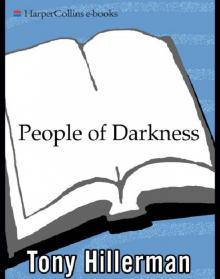 People of Darkness
People of Darkness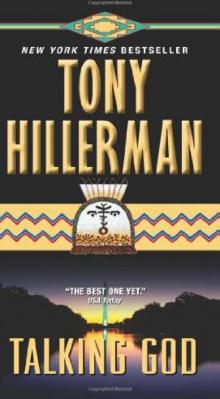 Talking God jlajc-9
Talking God jlajc-9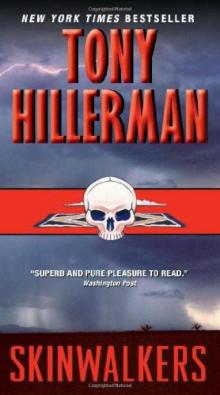 Skinwalkers jlajc-7
Skinwalkers jlajc-7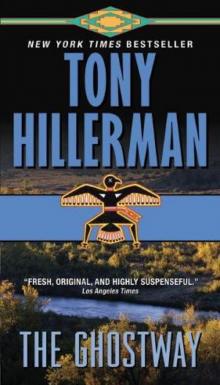 The Ghostway jlajc-6
The Ghostway jlajc-6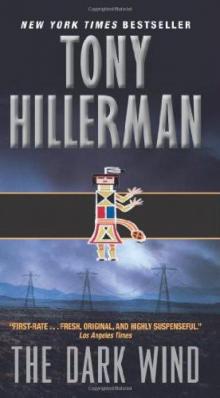 The Dark Wind jlajc-5
The Dark Wind jlajc-5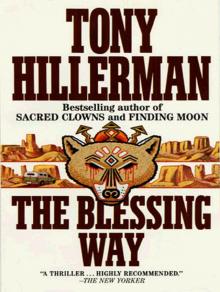 The Blessing Way
The Blessing Way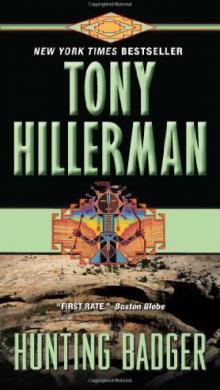 Hunting Badger jlajc-14
Hunting Badger jlajc-14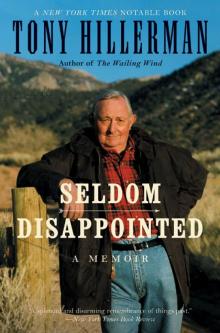 Seldom Disappointed: A Memoir
Seldom Disappointed: A Memoir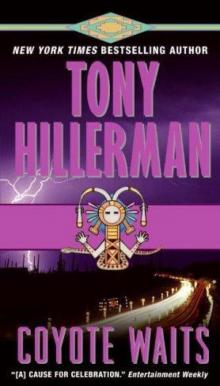 Coyote Waits jlajc-10
Coyote Waits jlajc-10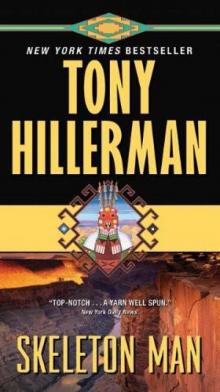 Skeleton Man jlajc-17
Skeleton Man jlajc-17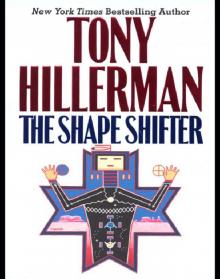 The Shape Shifter
The Shape Shifter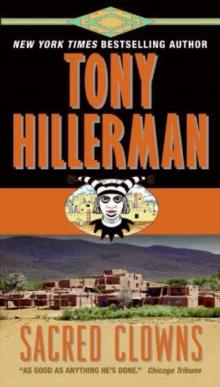 Sacred Clowns jlajc-11
Sacred Clowns jlajc-11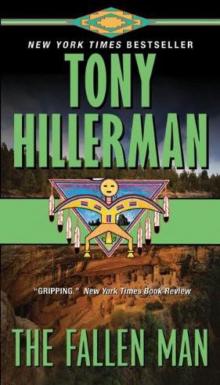 The Fallen Man jlajc-12
The Fallen Man jlajc-12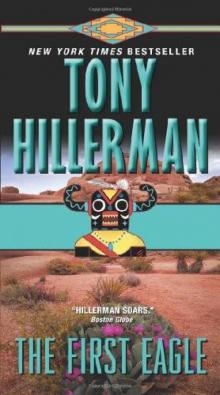 The First Eagle jlajc-13
The First Eagle jlajc-13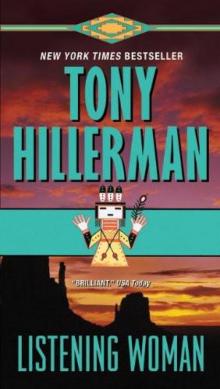 Listening Woman jlajc-3
Listening Woman jlajc-3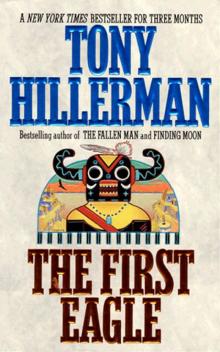 The First Eagle
The First Eagle Skeleton Man
Skeleton Man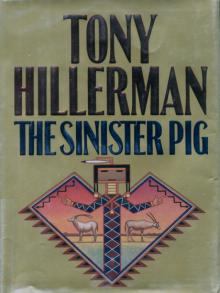 The Sinister Pig jlajc-16
The Sinister Pig jlajc-16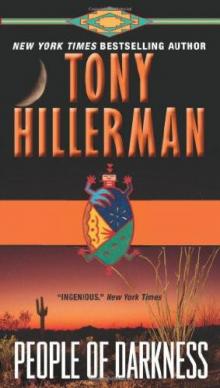 People of Darkness jlajc-4
People of Darkness jlajc-4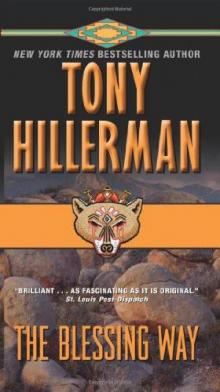 The Blessing Way jlajc-1
The Blessing Way jlajc-1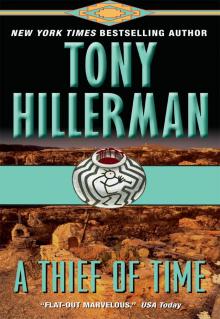 A Thief of Time
A Thief of Time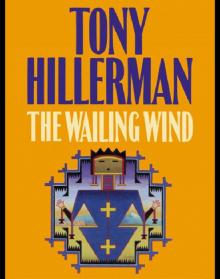 The Wailing Wind
The Wailing Wind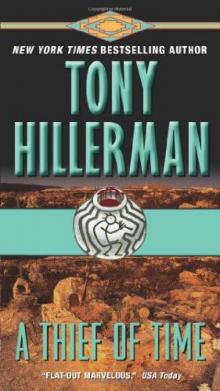 A Thief of Time jlajc-8
A Thief of Time jlajc-8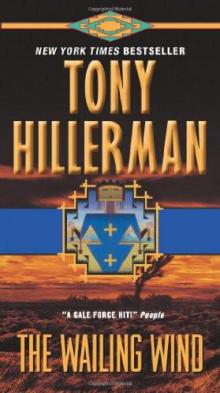 The Wailing Wind jlajc-15
The Wailing Wind jlajc-15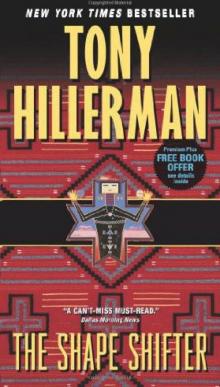 The Shape Shifter jlajc-18
The Shape Shifter jlajc-18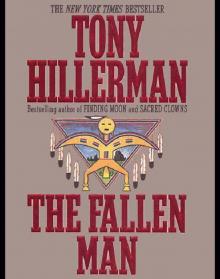 The Fallen Man
The Fallen Man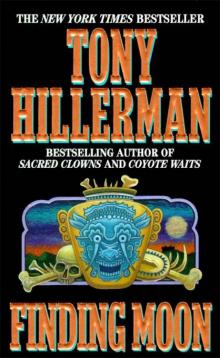 Finding Moon
Finding Moon